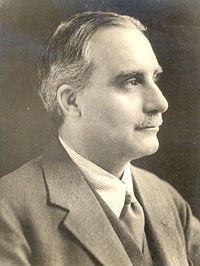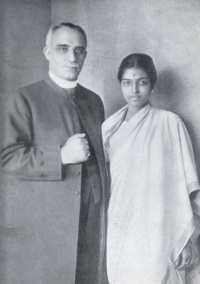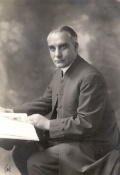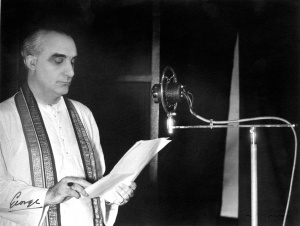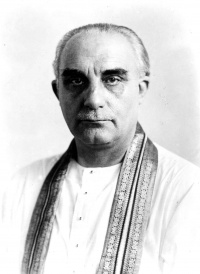George S. Arundale: Difference between revisions
No edit summary |
No edit summary |
||
| Line 1: | Line 1: | ||
[[Category:Presidents of TS Adyar|Arundale, George S.]] | [[Category:Presidents of TS Adyar|Arundale, George S.]] | ||
[[Category:General Secretaries in TS Adyar|Arundale, George S.]] | [[Category:General Secretaries in TS Adyar|Arundale, George S.]] | ||
| Line 25: | Line 24: | ||
Two years later, at Dr Besant’s invitation, he went to India with his aunt to become Professor of History at the [[Central Hindu College]], Benares (now Varanasi). In 1907 he was appointed Headmaster of the Central Hindu College School, and later Principal of the College. He was very popular with both teachers and students, for he had a great understanding of youth. | Two years later, at Dr Besant’s invitation, he went to India with his aunt to become Professor of History at the [[Central Hindu College]], Benares (now Varanasi). In 1907 he was appointed Headmaster of the Central Hindu College School, and later Principal of the College. He was very popular with both teachers and students, for he had a great understanding of youth. | ||
<ref>"George Sydney Arundale (1878 - 1945)," Theosophical Society, Adyar Web page. [http://www.ts-adyar.org/node/80]</ref> | <ref>"George Sydney Arundale (1878 - 1945)," Theosophical Society, Adyar Web page. [http://www.ts-adyar.org/node/80]</ref> | ||
== Marriage == | == Marriage == | ||
Revision as of 16:32, 21 July 2012
Early years and education
George Sydney Arundale was born on December 1, 1878 in Surrey, England. His mother died at childbirth, and George was adopted by his aunt, Francesca Arundale. Miss Arundale joined the Theosophical Society in 1881 and often welcomed Madame H. P. Blavatsky to her home.
Young George attended schools in in Germany and in England, and in 1900 he was graduated from St John’s College, Cambridge.
Career as educator
Two years later, at Dr Besant’s invitation, he went to India with his aunt to become Professor of History at the Central Hindu College, Benares (now Varanasi). In 1907 he was appointed Headmaster of the Central Hindu College School, and later Principal of the College. He was very popular with both teachers and students, for he had a great understanding of youth. [1]
Marriage
In 1920 Mr. Arundale married Srimati Rukmini Devi, the sixth child a very well-known Theosophical Brahmin family. The ceremony was conducted by Alladi Mahadeva Shastri.[2] Rukmini Devi "was the first well-known Brahmin lady to break caste by marring a foreigner."[3] She and her family were ostracized by their Brahmin associates, but with support of Theosophists, the Indian public eventually adjusted to the marriage. She accompanied him on his worldwide lecture tours, and became well known to Theosophists in many countries.
The Arundales in London
Rukmini Devi gave an account of travel to England:
Dr. Arundale had a wide circle of friends in London. His father was a famous architect. I was told that he was invited by the Shah of Oman to renovate his Palace, since at that time, he was considered the best person to do it. The family was well known and they had many friends among the aristocracy and famous artists. Dr. Arundale himself was very popular. We stayed in the hosue of the COuntess De la Warr and there were always people coming and going, gaden parties, outings and shipping trips... Mr. Arundale took me to so many concerts and dances, we visited all the museums and art galleries and even among his friends, there were many great artists and painters. He used to play the piano very well, he could also compose music. He wanted me to see everything that the loved and appreciated in Western art.[4]
Theosophical work
In 1927 he was away from Australia for a time on a lecture tour in Europe and the United States; Mrs Arundale and he were the guests of honour at the American Convention that year, and participated in the dedication of the headquarters building that was then being completed. Each year from 1931 to 1934, he undertook such lecture tours, greatly vitalizing the Theosophical work in the countries he visited."[5]
Social activism and imprisonment
Arundale became involved with the All-India Home Rule League and was imprisoned, with Annie Besant, in 1917, under the Defence of India Act, 1917.
General Secretary in Australia
He became General Secretary in Australia, 1926, where, in addition to his Theosophical duties, he engaged in humanitarian and political work. He helped to set up the 2GB Broadcasting Station and became its first Chairman of Directors. He lived at The Manor and assisted Bishop Leadbeater in preparing it for its important future.
General Secretary in India
In 1928, Dr. Arundale was General Secretary in India, but he did not seek re-election.
President of the Theosophical Society
Co-Masonry
As a Co-Freemason, joining in 1902, he became, 1935, the Most Puissant Grand Commander, Eastern Federation, and Representative of the Supreme Council.
Liberal Catholic Church
In 1926, he became Regionary Bishop of the Liberal Catholic Church in India.
Other activities
"Dr Arundale was known not only for his Theosophical work but also for his interest in Co-Freemasonry, and the Indian Scout movement, being for some years Provincial Commissioner for Madras Province."[6]
Writings
Dr. Arundale wrote these books:
- Bedrock of Education. Adyar: Theosophical Publishing House, 1924.
- Thoughts of the Great. Adyar: Theosophical Publishing House, 1924.
- You. Adyar: Theosophical Publishing House, 1935.
- Gods in the Becoming Adyar: Theosophical Publishing House, 1936.
- Education for Happiness. Adyar: Theosophical Publishing House, 1938.
- A Guardian Wall of Will: A Form of Tapas-Yoga. Available on Anand Gholap Web page.[5]
- Adventures in Theosophy. Adyar: Theosophical Publishing House, 1941.
- Kundalini: An Occult Experience. Wheaton: Theosophical Publishing House,??
- The Lotus Fire: A Study in Symbolic Yoga. Wheaton: Theosophical Publishing House, ??
- Nirvana. Wheaton: Theosophical Publishing House, ??
- Occult Commentaries. Wheaton: Theosophical Publishing House,?? Audio recording of lecture on compact disk.
- The Way of Service, 1919. Available at [6]
In addition, he wrote over 2200 articles for Theosophical periodicals, being especially prolific during the years that he served as President and as editor of The Theosophist. To see a list, go to the Union Index of Theosophical Periodicals.
Later years
Dr. Arundale's official biographical notes on the Theosophical Society, Adyar Web page describe his last months:
"In 1945 he was advised complete rest for he was gravely ill, and despite all the care and attention given to him, he passed away on 12 August, just as the news that the world war had ended spread throughout the world. One of the finest contributions made to the Society’s work by Dr Arundale is best described by another slogan he invented — ‘Together Differently’. Repeatedly and insistently, he emphasized in his writings and talks that differences of outlook and opinion could only enrich the work of The Theosophical Society. Another important contribution was the emphasis he gave to straight Theosophy in the campaign which he initiated under that name. It cannot be said that any one of his contributions was more important than another, but the two mentioned above did unquestionably bring about a definite change in the minds and hearts of the membership, and sharply emphasized once more the freedom of individual thought inherent in Theosophical teachings. [7]
Rukmini wrote of his decline:
From 1942 onwards Dr. Arundale's health had been slowly deteriorating. He was such an uncomplaining, cheerful person that I never knew how seriously ill he was. he was highely diabetic but because of his principles would not take medicines which were produced by killing animals. I would pester him to come with me on my dance tours never realizing what a great effort he was making to please me. He passed away in 1945. Till the last moment I was so sure that he would be cured. He had always been there to take care of things but he was also preparing me in many ways - I can see it now - to stand on my own.[8]
Mrs. Arundale traveled to Haridwar and Rishikesh to immerse his ashes.[9]
Notes
- ↑ "George Sydney Arundale (1878 - 1945)," Theosophical Society, Adyar Web page. [1]
- ↑ ”Sarada Hoffman,” KutcheriBuzz Website www.kutcheribuzz.com/features/interviews/sarada.asp, accessed February 28, 2012.
- ↑ Joseph E. Ross, Spirit of Womanhood, privately published by the author, 2009: vii.
- ↑ Rukmini Devi Arundale, "Rukmini on Herself," Rukmini Devi Arundale: Birth Centenary Commemorative Volume, Shakuntala Ramani, ed., (Chennai, India: The Kalakshetra Foundation, 2003), 26.
- ↑ "George Sydney Arundale (1878 - 1945)," Theosophical Society, Adyar Web page. [2]
- ↑ "George Sydney Arundale (1878 - 1945)," Theosophical Society, Adyar Web page. [3]
- ↑ "George Sydney Arundale (1878 - 1945)," Theosophical Society, Adyar Web page. [4]
- ↑ Rukmini Devi Arundale, "Rukmini on Herself," Rukmini Devi Arundale: Birth Centenary Commemorative Volume, Shakuntala Ramani, ed., (Chennai, India: The Kalakshetra Foundation, 2003), 64.
- ↑ Ibid., 64
Additional resources
- The Theosophist, Vol. 66, No. 12, September 1945 (Commemorative Issue).
American Section, study course on Theosophy and Theosophical Society (Theosophical Society Archives).
- Dixon, Joy, Divine Feminine: Theosophy and Feminism in England (London: John Hopins, 2001)
- Lutyens, Mary, Krishnamurti: The Years of Awakening (London: John Murray, 1975)
- Lutyens, Mary, The Life and Death of Krishnamurti (London: John Murray, 1990)
- Meduri, Avanthi (ed.), Rukmini Devi Arundale (1904-1968): A Visionary Architect of Indian culture and the Performing Arts (Delhi: Motilal Banarsidass, 2005)
- Ransom, Josephine. The Seventy-Fifth Anniversary Book of the Theosophical Society. Theosophical Publishing House, 2005.
